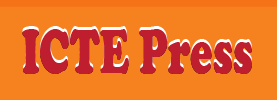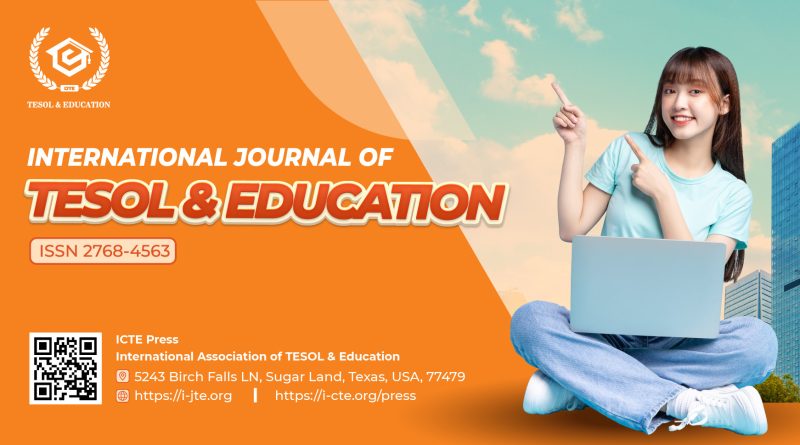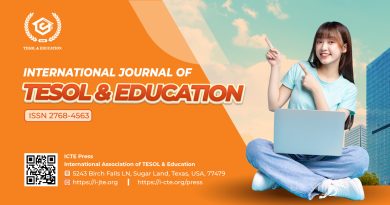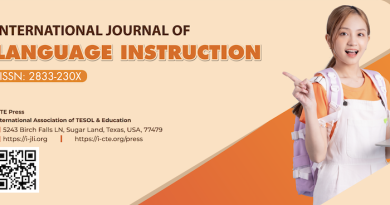TESOL & Education: Vol. 5 No. 3 (2025)
Dear beloved TESOLers & Educators,
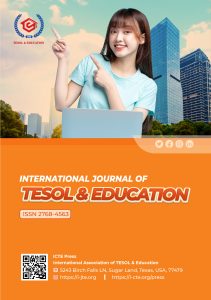 We are happy to inform you that Volume 5, Issue 3, 2025 of the International Journal of TESOL & Education (IJTE) has been published successfully. This issue brings together a variety of recent research papers that look at important topics in English language education, such as how students feel, new teaching methods, and how to use technology in the classroom. This issue has 11 articles, including studies on EMI and inequality (Mahjabeen), Dictogloss for cooperative learning (Ngo), immersive technology in ELT (Ngo & To), foreign language enjoyment and anxiety (Vo), English films for speaking (Ho & Le), peer assessment (Le et al.), the process approach to writing (Datta), performance tasks in reading (Limbu), consecutive group work (Le & Nguyen), project-based learning in marketing ESP (Ngo & Tran), and a book review on AI-powered education (Rodriguez). This issue has the contributions of authors from Bangladesh, Nepal, USA, and Vietnam.
We are happy to inform you that Volume 5, Issue 3, 2025 of the International Journal of TESOL & Education (IJTE) has been published successfully. This issue brings together a variety of recent research papers that look at important topics in English language education, such as how students feel, new teaching methods, and how to use technology in the classroom. This issue has 11 articles, including studies on EMI and inequality (Mahjabeen), Dictogloss for cooperative learning (Ngo), immersive technology in ELT (Ngo & To), foreign language enjoyment and anxiety (Vo), English films for speaking (Ho & Le), peer assessment (Le et al.), the process approach to writing (Datta), performance tasks in reading (Limbu), consecutive group work (Le & Nguyen), project-based learning in marketing ESP (Ngo & Tran), and a book review on AI-powered education (Rodriguez). This issue has the contributions of authors from Bangladesh, Nepal, USA, and Vietnam.
In this issue, Mahjabeen (2025) examines the function of English as a Medium of Instruction (EMI) in intensifying educational disparity at private universities in Bangladesh. The study employs a mixed-method design, incorporating surveys of 50 students and interviews with 10 teachers, to elucidate disparities between Bangla-medium and English-medium learners. The findings indicate difficulties in language proficiency, self-assurance, and classroom equity, while advocating for inclusive practices to alleviate inequality.
Ngo (2025) examines the implementation of Dictogloss as a collaborative learning strategy to improve English language acquisition among non-English majors at a Vietnamese university. The study demonstrates that Dictogloss markedly enhances students’ motivation, engagement, and proficiency in listening, speaking, and writing through the utilization of surveys, interviews, and teacher diaries. The results show how important it is to include Dictogloss in lessons to encourage language learning that is collaborative, interactive, and effective.
Ngo and To (2025) examine the function of immersive technologies—Virtual, Augmented, and Mixed Reality—in the development of enriched affordance environments for English Language Teaching. Based on affordance theory and sociocultural perspectives, the study emphasizes increased engagement, communicative competence, and learner autonomy, while also addressing challenges such as cost, accessibility, and teacher training. The review underscores the pedagogical potential and prospective pathways for the integration of immersive tools into English Language Teaching (ELT).
Vo (2025) examines the correlation among Foreign Language Enjoyment (FLE), Foreign Language Classroom Anxiety (FLCA), and student performance at HUFLIT. The study of 98 students shows that they enjoy learning a foreign language a lot, are moderately anxious, and that teacher appreciation plays a big role in shaping FLE. The findings indicate that Foreign Language Enjoyment (FLE) and Foreign Language Classroom Anxiety (FLCA) coexist dynamically, affecting academic performance and implying pedagogical approaches to increase enjoyment while mitigating anxiety.
Ho and Le (2025) investigate the impact of English films on the speaking proficiency of 112 English majors at a private university in Vietnam. Through surveys and interviews, they discovered that films enhanced vocabulary, pronunciation, and motivation, although fluency and confidence exhibited minimal improvement. Some of the problems were fast speech, different accents, and cultural references. Teachers and students concurred that films enhance learning when judiciously chosen and facilitated.
Le, Pham, Than, and Nguyen (2025) look into how peer assessment can help EFL students at Tay Nguyen University improve their speaking skills. The study, which used surveys with 80 students and interviews with 12, shows that peer feedback can help with pronunciation, vocabulary, fluency, and self-awareness. Some of the problems were unclear rubrics and vague feedback. To get the most out of their work, the authors suggest clearer standards, training, and supportive settings.
Datta (2025) examines the effectiveness of the process approach in teaching English writing at universities in Bangladesh. The study employs surveys with 36 teacher-candidates and interviews with 10 participants, demonstrating robust endorsement for pre-writing, revising, and editing as crucial phases. The findings underscore that the process approach cultivates critical thinking, autonomy, and writing quality, advocating for its systematic implementation throughout tertiary education.
Limbu (2025) examines the perspectives of teachers, parents, and students regarding disciplinary issues in Nepalese schools through narrative inquiry involving 11 participants. The findings indicate a transformation in student behavior, a decline in teacher authority, parental disengagement, and profit-oriented school policies that exacerbate blame. The study underscores the necessity for collaboration, explicit disciplinary protocols, and enhanced parent-teacher relationships to elevate discipline, educational outcomes, and EFL classroom environments.
Le and Nguyen (2025) examine the implementation of successive group-work activities in English classes at a Vietnamese public university. The study, which included interviews with nine students and two teachers, found that fixed groups made people more likely to participate, take responsibility, and work together. However, there were also problems, such as unequal contributions and stress. Suggestions stress the need for clear rules, teacher support, and structures that help groups learn in a way that lasts.
Ngo and Tran (2025) examine the efficacy of project-based learning (PBL) in improving oral presentation skills among third-year English majors enrolled in a Basic Marketing course at HUIT. The study shows big improvements in students’ confidence, communication, and teamwork by using tests, surveys, interviews, and observations of the classroom. Even though there were problems with time, resources, and group coordination, PBL worked very well.
Rodriguez (2025) writes a review of the book “AI-Powered Education: Innovative Teaching Strategies to Elevate Student Learning,” which was edited by Magruder, Cavallo, and Clark. The book presents 13 practical activities that demonstrate how AI tools such as ChatGPT can ethically improve learning across various disciplines. It balances new ideas with caution by promoting responsible integration and focusing on creating rubrics, immersive simulations, and critical thinking. It is very useful and easy to use, so teachers should definitely get it.
These studies reviewed offer significant insights into modern English language education, emphasizing advancements in pedagogy, learner engagement, and the incorporation of technology. A principal theme arising from Mahjabeen’s (2025) investigation of EMI in Bangladesh and Vo’s (2025) analysis of foreign language enjoyment (FLE) and anxiety (FLCA) in Vietnam is the affective dimension of learning. Both studies demonstrate that linguistic proficiency and academic achievement are influenced by students’ emotions, with English as a Medium of Instruction (EMI) potentially intensifying inequality, while supportive educators and positive peer interactions enhance enjoyment and alleviate anxiety.
Innovations in teaching, like Dictogloss (Ngo, 2025), immersive technologies (Ngo & To, 2025), English films (Ho & Le, 2025), and peer assessment (Le et al., 2025), show that interactive, student-centered methods make students more interested, better at communicating, and more independent. Films and immersive technologies enhance vocabulary, pronunciation, and cultural awareness, whereas peer assessment fosters responsibility and collaborative skills, despite challenges related to bias and ambiguous feedback. Likewise, Le and Nguyen’s (2025) research on consecutive group work highlights the importance of fixed structures in fostering accountability, while also warning that unequal participation and stress must be managed through meticulous facilitation.
Datta’s (2025) study of the process approach in Bangladesh focused on writing development. It showed that drafting, revising, and editing over and over again helped students think critically and become more aware of their own thinking. Alongside Ngo and Tran’s (2025) findings on project-based learning (PBL) in a Vietnamese ESP context, the evidence indicates that process-oriented and project-based pedagogies substantially improve presentation and writing skills, equipping students for workplace requirements. Nevertheless, difficulties such as time limitations, insufficient resources, and initial student reluctance were consistently noted in both PBL and group-work research, highlighting the necessity for scaffolding and teacher support.
Lastly, Limbu’s (2025) narrative inquiry into the relationships between parents, teachers, and students in Nepal places language education in a larger social and cultural context. The results emphasize that disciplinary challenges and evolving authority dynamics influence classroom efficacy, serving as a reminder to educators that pedagogical approaches must be integrated with institutional and cultural contexts.
In general, these studies agree that learner-centered, collaborative, and process-based teaching methods, with the help of technology and an awareness of emotional factors, lead to big gains in language skills and soft skills. But for sustainability to happen, there needs to be support from institutions, training for teachers, and an ethical way to use tools, including new AI tools, to make sure that everyone has a fair chance and that students do well in the long run.
All in all, the eleven studies show how learner-centered, process-oriented, and technology-enhanced teaching methods can change the way English is taught. Methods like Dictogloss, peer assessment, project-based learning, and the process approach to writing show clear benefits for speaking, writing, and overall communication skills. In the same way, using movies, immersive technologies, and organized group work can help people become more motivated, independent, and cooperative while also helping them develop soft skills that can be used in other situations. Nonetheless, in various contexts, challenges like unequal participation, ambiguous feedback, limited resources, and emotional barriers highlight the essential need for teacher scaffolding and institutional support. The results also show how socio-cultural factors, like EMI-related inequality and changing relationships between teachers, students, and parents, can affect learning outcomes. These studies demonstrate that enduring enhancements in English language acquisition necessitate not only innovative pedagogical approaches and emerging technologies but also nurturing environments that cater to learners’ emotional needs, ensure equitable opportunities, and equip students with both linguistic competence and essential life skills.
We sincerely thank all the authors for their helpful ideas that make scholarly conversation in TESOL and education better. We also want to thank the peer reviewers from the bottom of our hearts. Their knowledge and helpful comments made sure that the published works were of the highest quality. Finally, we want to thank the editorial staff for their hard work and professionalism in getting this issue done.
This issue shows that IJTE is still dedicated to encouraging conversation about new problems and ideas in language education around the world. We encourage our readers to read these articles, use them in their own work, and write for future issues.
Thank you for your continued support and dedication to the International Journal of TESOL & Education. We look forward to bringing you more exceptional content in the future.
Thanks be to God for everything!
Warm regards,
Associate Professor Dr. Pham Vu Phi Ho
Editor-in-chief
International Journal of TESOL & Education
DOI: https://doi.org/10.54855/ijte.2553
